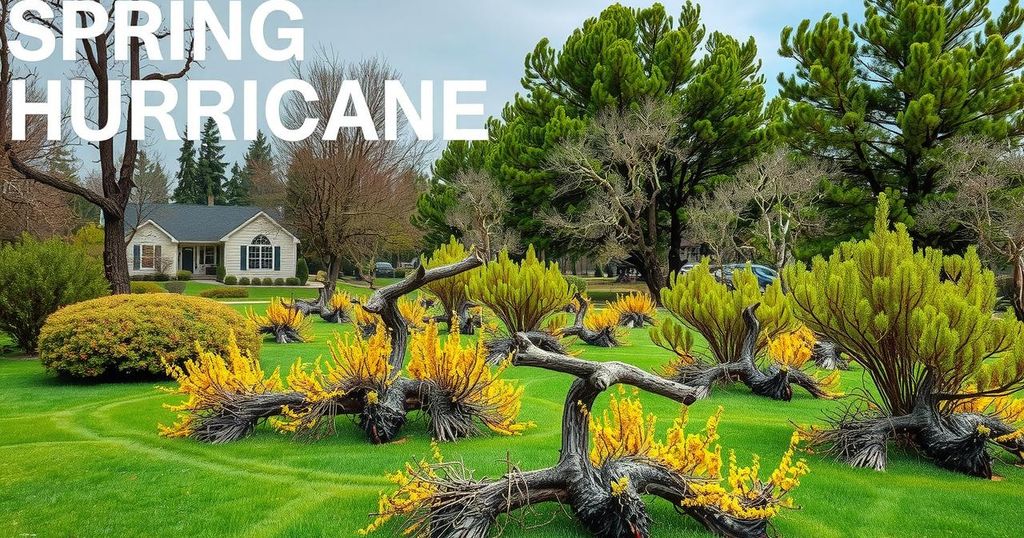World news
” STEINBERG, AFRICA, CLIMATE, CLIMATE CHANGE, ENVIRONMENT, EXTREME WEATHER, HELENE, MICHELE STEINBERG, MID - ATLANTIC, NATIONAL FIRE PROTECTION ASSOCIATION, NATURAL DISASTERS, NEW ENGLAND, NORTHEAST TENNESSEE, SAFETY, SOUTH AFRICA, SOUTHWEST VIRGINIA, STEINBERG, VIRGINIA
Michael Grant
0 Comments
Hurricane Helene: Long-Term Impacts on Wildfire Risks and Future Hurricane Predictions
Hurricane Helene has left communities in Virginia, Tennessee, and North Carolina at risk for wildfires due to downed debris. Michele Steinberg of the NFPA discusses how fire can naturally benefit ecosystems but also poses risks to homes if proper precautions are not taken. Projections indicate an active 2025 hurricane season, emphasizing the importance of preparedness.
In the aftermath of Hurricane Helene, communities in Southwest Virginia, Northeast Tennessee, and Western North Carolina continue to grapple with the devastation. Months after the storm’s passing, the lingering impacts pose an increased risk of wildfires due to the debris that the hurricane left behind. Michele Steinberg, Wildfire Division Director at the National Fire Protection Association, emphasizes that the downed materials from Helene significantly alter wildfire risk patterns in the region.
Steinberg identifies that fire can have positive aspects for ecosystems, naturally replenishing soil nutrients and clearing excess growth. “Fire on the landscape does all kinds of beneficial things like returning nutrients to the soil” – Michele Steinberg. For areas in the Northeast, Mid-Atlantic, and Southern states, wildfires often occur in spring and fall, driven by favorable weather conditions.
She explains that certain climatic conditions can lead to wildfires even while patches of snow remain. Wildfires are most likely to occur when there is dry material, solar heating, and wind. Unfortunately, as human structures are integrated into these environments, homes and vehicles may fuel wildfires, complicating safety and evacuation efforts.
After hurricanes like Helene, the violent storm leaves a significant amount of dead vegetation, which can serve as ample fuel for wildfires. “You’ve got a huge fuel load of all those trees down. You’re not getting the natural regeneration” – Michele Steinberg. This scenario creates conditions for larger and potentially more intense wildfires, especially as fire services focus on restoring infrastructure rather than managing the aftermath of wildfires.
Michele Steinberg noted that local emergency services recognized the elevated wildfire risks soon after Helene struck. The region has since already experienced some of the worst wildfires in over a decade, a pattern not uncommon after major hurricanes. She advises residents to be informed about conditions leading to wildfires, including understanding “Red Flag Warnings,” which indicate critical fire conditions.
Homeowners can help mitigate risks by maintaining their property, removing debris near their homes, and being vigilant about fire warnings. “Make sure there’s nothing accumulating there – leaves, debris,” Steinberg cautions, highlighting the importance of cleaning areas near structures to prevent embers from igniting fires.
Furthermore, resources provided by the National Fire Protection Association support communities in preparing for wildfire season. Many neighborhoods in Virginia participate in the NFPA’s Firewise USA program, promoting collaboration in fire risk management as the spring wildfire season continues through April.
In addition to wildfire concerns, projections from Colorado State University anticipate an above-average hurricane season in 2025, with forecasts indicating 17 named storms, including nine hurricanes. Levi Silvers from CSU attributes this expectation to warmer sea-surface temperatures and the influence of La Niña, which can enhance tropical development potential.
The remnants of Hurricane Helene have left communities facing heightened wildfire risks due to the accumulated debris. Understanding fire dynamics and maintaining properties is crucial for residents, especially in areas prone to such disasters. Concurrently, forecasts from Colorado State University suggest an increase in hurricane activity, reinforcing the need for preparedness against both hurricanes and wildfires in the future.
Original Source: www.wvtf.org




Post Comment